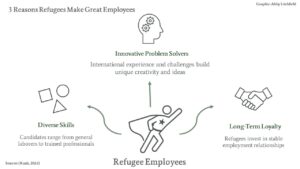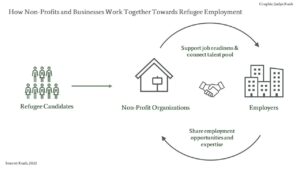Refugees are an overlooked talent pool. Working with a non-profit organization can smooth the hiring process.
In today’s job market, it can be hard for companies to find good employees. Hiring refugees can help fill staffing gaps while advancing corporate social responsibility goals. If you haven’t hired from this talent pool before, don’t worry! Partnering with non-governmental organizations (NGOs) can smooth the hiring process and get your company on the right path.
There’s a clear model for this kind of company-NGO partnership. In award-winning research, scholars Eun Su (Jeannie) Lee (Newcastle Business School) and Betina Szkudlarek (University of Sydney) looked at how this approach works in Australia. They interviewed managers at NGOs focused on refugee employment and at organizations that had hired refugees.
I spoke with the researchers, along with Rebecca Benest, manager of program development at NGO Jumpstart Refugee Talent (JRT). JRT provides refugee employment services in Canada.
Lee, Szkudlarek, and Benest described similar opportunities, challenges, and solutions in refugee employment around the world. They identified three areas where NGOs and companies can work together to advance refugee employment: 1) expectation setting, 2) job readiness, and 3) cultural expertise.
This article summarizes their insights –and demonstrates that collaboration in these areas can result in wins for employers and refugees.
Why Companies Should Hire Refugees
First, let’s talk about who refugees are. Officially, a refugee is “someone who has been forced to flee his or her country because of persecution, war or violence.” There are 27 million refugees around the world, with most coming from Syria, Venezuela, Afghanistan, South Sudan, Myanmar, and now Ukraine.
Refugees are an amazing talent pool. Here are some of their strengths:
- Their international experience makes them more innovative and better problem solvers. Coming from a different context, they have “a unique creativity, a different set of ideas,” said JRT’s Benest.
- They represent diverse skills and expertise, from general labourers to trained professionals with decades of experience.
- They’re often loyal workers. As Benest commented: “Coming from this context of change, they’re often looking for stability. They want somebody to invest in them over the long term, in exchange for their investment over the long term.”
Hiring refugees is also one way companies can address humanitarian needs, as part of a corporate social responsibility (CSR) portfolio. By supporting refugees, they can advance human rights and inclusion. They also respond directly to very human pain. The UN Refugee Agency describes the need: “Imagine being forced to flee your country in order to escape to safety. If you were lucky you had time to pack a bag. If not, you simply dropped everything and ran.”
Through employment, refugees contribute to their new country and build a sense of meaning. Research shows that employment raises refugees’ wellbeing substantially more than an income alone.
Ultimately, Benest says, filling jobs leads to “higher salaries contributing to higher taxes, less social strain to support individuals, and also the financial benefit of having those great minds working towards the advancement of their industries.”
Why Companies Don’t Hire Refugees
Refugees bring multiple economic benefits. For example: It’s estimated that the Canadian economy would gain $50 billion in income and taxes if immigrants and refugees were fully employed. Yet, many refugees often end up unemployed or underemployed.
Slow refugee hiring happens partly due to government red tape – in many countries, refugees haven’t historically had an immediate right to work.
But there’s also a mismatch with companies’ usual approach to human resources. Companies are used to hiring people through a set of familiar channels, and screening applicants for specific skills and credentials.
The challenge is that refugees:
- May lack some specific skills, for example with the local language or computer literacy.
- May not have proper documentation of professional qualifications from their home countries, or may have different qualifications
- Often don’t have direct connections to potential employers.
- May be unfamiliar with some local cultural norms.
Partnership can overcome those challenges. Here’s what that looks like.
How NGOs Can Help Companies Hire Refugees
In most countries, NGOs are the first point of contact for refugees. Governments generally charge refugee-focused NGOs with providing services in language and job training, cultural education, and referrals.
When companies and NGOs work together, refugee hiring becomes much smoother. Together, they can address 3 key areas: expectations management, job-readiness training, and development of cultural expertise.
Here’s what effective refugee hiring looks like, with illustration from Jumpstart Refugee Talent (JRT).
1. Set expectations of employers and refugees
Employers need a sense of what refugees have experienced. Refugees need to map their skills and interests onto a new landscape.
At JRT, the Refugee Talent Hub team meets with potential employers to orient them to differences in hiring refugees. For example, a resume might have a gap – because the person was fleeing war. “Some refugee candidates are not comfortable speaking about their background,” Benest says, meaning that a basic interview question on a candidate’s past may be much more complicated for a refugee candidate to answer fluidly.
JRT encourages hiring managers to consider which requirements are essential for a job and where comparable skills or experiences might be adequate. From there, JRT matches the company with refugee candidates that best fit the position, and the candidates continue through regular hiring processes.
Benest provides examples of ways that hiring processes can be flexible on requirements:
- C# is a programming language that’s a common requirement, but internationally many web developers know an earlier version, such as C or C++. It’s not difficult to train up on C# with the related language under your belt, but this alone is often enough to disqualify someone.
- Sometimes a job description will require, for example, banking experience in the same country. Often a candidate will have more than enough experience, but in their home country, disqualifying them. Working with a banking employer to consider such experience can be important for refugee candidates.
Refugees may want to stay in their old area of expertise or try something new: a doctor might become a social worker. They may seek flexibility, to accommodate language lessons or family resettlement. Often a priority is just getting an initial internship or opportunity, to build experience and references. People are simply “hopeful to be given a chance to rebuild their lives,” said Szkudlarek.
2. Build job readiness.
Before any job is considered, NGOs can provide language and socio-cultural training. Some also provide specific professional training. They can also help with the job search and provide interview practice. Companies can inform this process. For example, corporate HR professionals can volunteer to provide training sessions and career coaching.
Refugees haven’t been focused on their job prospects, Szkudlarek noted. “They’re fleeing – they never intended to come to a given country. So they haven’t thought about their employment, CV, the interview processes or the job market dynamics.”
At JRT, Benest and her colleagues work with candidates selected for an interview and prepare them to answer questions. That can include finding ways to work around sensitive topics. A first round of interviews often focuses on a candidate’s life story, which can be a difficult or a sensitive topic for people fleeing conflict.
Feedback between the NGO, refugee, and company can help matches improve over time. “It’s sometimes really hard because employers get thousands of applications every single day that they have to go through,” said Benest. She urges employers to spend more time interviewing and giving feedback.
3. Provide cultural expertise.
Every country has specific customs and practices that can take new people by surprise. These can be related to procedures: for example, a standard probationary period in new jobs. Cultural norms might be different: an emphasis placed on being proactive, for example. Sometimes there’s a different sense of humour. Szkudlarek recalls a refugee job candidate puzzled by an Australian interviewer who asked: “If you were an animal, what would you be and why?”
JRT aims to provide an open door for people asking questions about what they encounter. This is another area where corporate volunteers can help provide helpful orientation, before and after job placements. Cross-cultural training should go both ways: At workplaces, human resources can build awareness of the unique circumstances of refugees.
How to Step Up and Hire Refugees
If your company is interested in getting involved, you might want to start by reaching out to a local refugee employment roundtable that highlights non-profit work. Hire Immigrants is a Canadian example; in Australia, there’s the Australian Employer Network for Refugee Inclusion. These can be places to learn from corporate peers about what works, and to understand what non-profits are in the space.
Don’t be afraid to start small, say Szkudlarek, Lee, and Benest. One passionate individual can make a difference. “They don’t have to have thousands of dollars set aside to start a CSR initiative or start by recruiting 10 or 20 refugees,” said Lee.
Your company might start with internships for refugees rather than jobs, for example. These can provide refugees with valuable on-the-job training. They can also make the workplace more open to hiring refugees in the future. Volunteering with NGOs’ mentorship and training programs is also valuable.
Good models can provide guidance and inspiration. IKEA is a leader in this area, say Szkudlarek and Lee. They point to the IKEA Employability Programme for refugees, which aims to “improve refugees’ capacity for inclusion in the labour market and their integration into our society.” The five-week paid program trains the new employees in-store, aiming to “improve retail sector employability, develop language skills and cultural norms of their receiving country, and boost overall confidence.”
In Canada, Bell’s Software Developer Talent Incubator Program provides another good model, said Benest. The company trains a group of new employees with limited experience in software development for two months, leading to employment with Bell and a clear route to grow within the company.
Refugee Employment Is Inspirational
Here are several refugee perspectives on the employment process:
Lamis, a refugee from Syria, worked with JRT. She offered advice for other refugees: “Don’t give up. I learned here, in Canada, an idiom that says, ‘No pain, no gain’. When you move to another country, all the doors are open, and you can improve your life if you work hard for it.”
Zaki Haidari fled Afghanistan and sought asylum in Australia. Unable to receive the right to work for many years, he volunteered with NGOs. Today he is a refugee rights campaigner for Amnesty International. He reflected: “I am very grateful that I learned the language and I’m now working full time, contributing back to the community that gave me so much and supporting others in their journey to safety.”
For researchers Lee and Szkudlarek, working on refugee employment is a life’s passion. “We recognize that we come from a very privileged place,” said Szkudlarek. “With privilege comes responsibility to help those who were not as fortunate.”
Their work can’t resolve all the challenges experienced by refugees. But, explains Lee, “Knowing that our research can improve the lives of at least a few people gives us energy and motivation to continue work in this important area.”
Read the Research
Lee, E. S. & Szkudlarek, B. 2021. Refugee employment support: The HRM-CSR nexus and stakeholder co-dependency. Human Resource Management Journal, 31(4): 936-955.
About the Award
Lee and Szkudlarek’s research won the 2022 Research Impact on Practice Award. This award recognizes research that can make a difference in the world. Since 2013, the Network for Business Sustainability has co-sponsored the award with the Academy of Management’s Organizations and the Natural Environment (ONE) Division. Discover all winners.





Add a Comment
This site uses User Verification plugin to reduce spam. See how your comment data is processed.This site uses User Verification plugin to reduce spam. See how your comment data is processed.